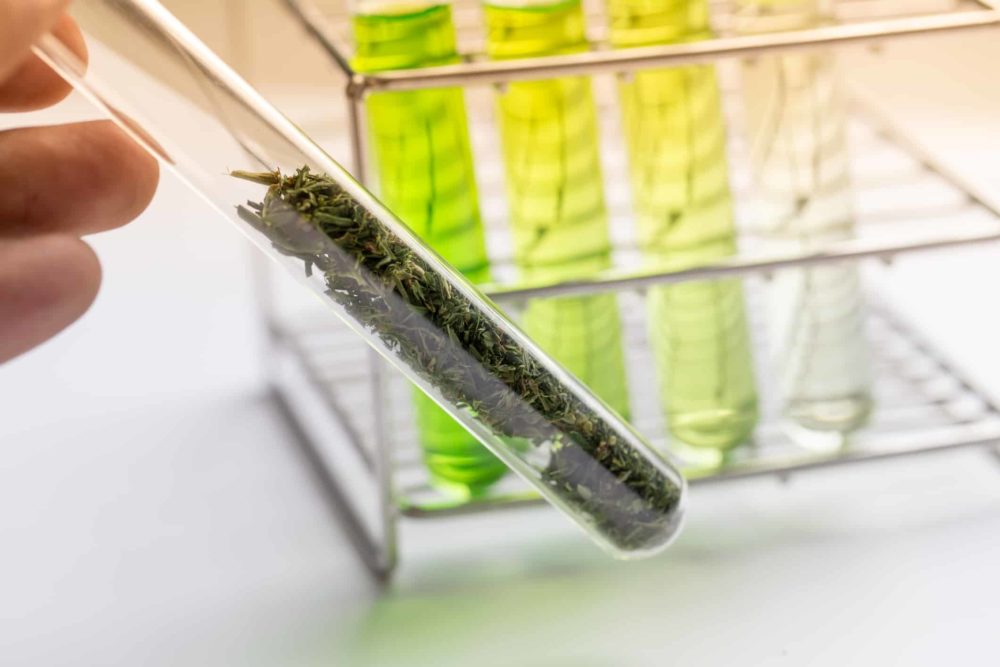You are here
Home 🌿 Cannabis Technology News 🌿 Made-in-Ottawa device puts testing in the hands of pot producers 🌿Made-in-Ottawa device puts testing in the hands of pot producers

Researchers at the University of Ottawa are developing a hand-held device they hope will revolutionize cannabis production by giving growers the ability to test the ratio of THC to CBD in their plants.
"It's a very quick, easy and low-cost test," Adam Shuhendler, an assistant professor in the school's chemistry department, told the CBC's Ottawa Morning.
"Push a button and out on the screen comes the ratio of CBD and THC."
Our goal really is accessibility.- Adam Shuhendler, University of Ottawa
Pot consumers will experience different effects depending on the ratio of tetrahydrocannabinol (THC) to cannabidiol (CBD).
Knowing that ratio is important for producers, Shuhendler said, because it can help them pinpoint what growing conditions produce optimal results. Right now, the gold standard method for testing the ratio is a high-performance liquid chromatography test.
The problem is the test requires some science expertise to conduct properly, and it's expensive. That's where Shuhendler and two colleagues at the U of O, Benoit Lessard and Cory Harris, saw an opportunity.

Cory Harris is one of the researchers at the University of Ottawa who helped develop a cheap, easy test to determine the ratio of CBD to THC in marijuana plants.
Cheap and easy to use
About a year and a half ago, they began developing the new cannabis testing kit. When it's completed it should be the size of a standard printer and about as easy to use.
Their device, for now dubbed "the marijuana project," will cost about 50 cents per test. It's not clear yet how much the device itself will cost, but they want it to be affordable, even for home growers.
"Our goal really is accessibility," Shuhendler said.
The machine has two main parts: a chip and a reader. The chip takes a marijuana sample of either liquid or smoke. The chip containing the sample is then placed in the reader. That's it.
The results are similar to the traditional test with a five per cent margin of error, Shuhendler said.
"We were really happy with that number because that technique is quite laborious and quite cumbersome," he said.
Lots of potential
Shuhendler and his colleagues, along with graduate student Nic Boileau, co-founded the company Ekidna that will produce and market the test kit. The University of Ottawa retains the intellectual property rights.
Shuhendler, who had little knowledge of the marijuana industry before starting the project, said the area offers a lot of potential for researchers.
"It's been really eye-opening seeing the technology going into the industry," he said.
"It's amazing seeing the science behind the industry and the efforts to evolve plants and to form plants with different medicinal versus recreational properties."
The U of O team hopes to be able to sell their device to licensed producers within the next 12 to 18 months.
420 Intel is Your Source for Marijuana News
420 Intel Canada is your leading news source for the Canadian cannabis industry. Get the latest updates on Canadian cannabis stocks and developments on how Canada continues to be a major player in the worldwide recreational and medical cannabis industry.
420 Intel Canada is the Canadian Industry news outlet that will keep you updated on how these Canadian developments in recreational and medical marijuana will impact the country and the world. Our commitment is to bring you the most important cannabis news stories from across Canada every day of the week.
Marijuana industry news is a constant endeavor with new developments each day. For marijuana news across the True North, 420 Intel Canada promises to bring you quality, Canadian, cannabis industry news.
You can get 420 Intel news delivered directly to your inbox by signing up for our daily marijuana news, ensuring you’re always kept up to date on the ever-changing cannabis industry. To stay even better informed about marijuana legalization news follow us on Twitter, Facebook and LinkedIn.




